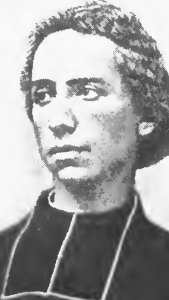Here are some of the passages at random.
Redemptoris Missio (1990):
Is it not possible to attain salvation in any religion? Why then should there be missionary activity?
Lionel:
We now know that his position was irrational and heretical.
However this error was accepted by Cardinal Richard Cushing the Archbishop of Boston and the Jesuits. They placed this new doctrine in Vatican Council II (AG 7,LG 14 etc).
Since then the Magisterium has accepted the Marchetti Inference i.e the dead for us who are saved allegedly without the baptism of water are visible on earth. They are physically visible.
Chapters 1-9 affirm Christ without the necessity of being a formal member of the Church for salvation. It also implies that there are people saved outside the Church, who are saved by Christ, and since these people are known, they are explicit exceptions to the strict interpretation of the dogma.Marchetti's error received the stamp of approval.
There were damage-control passages as the one which follows.However in general, the document was weakened with the Marchetti-error.
55...Indeed Christ himself "while expressly insisting on the need for faith and baptism, at the same time confirmed the need for the Church, into which people enter through Baptism as through a door." 101 Dialogue should be conducted and implemented with the conviction that the Church is the ordinary means of salvation and that she alone possesses the fullness of the means of salvation.-Redemptoris Missio.
_______________________________
DOMINUS IESUS (2000)
“it follows that all men and women who are saved share, though differently, in
the same mystery of salvation in Jesus Christ through his Spirit”.-Dominus Iesus 2
Lionel:
Here it is implied that there is salvation outside the Church without 'faith and baptism'. It is also being implied that these cases are known or will be known for them to be exceptions to the strict interpretation of the dogma on salvation. This was the inference in the Marchetti Letter which was approved by the Archdiocese of Boston.
4. The Church's constant missionary proclamation
is endangered today by relativistic theories which seek to justify religious
pluralism, not only de facto but also
de iure (or in principle). As a
consequence, it is held that certain truths have been superseded; for example,
the definitive and complete character of the revelation of Jesus Christ, the
nature of Christian faith as compared with that of belief in other religions,
the inspired nature of the books of Sacred Scripture, the personal unity between
the Eternal Word and Jesus of Nazareth, the unity of the economy of the
Incarnate Word and the Holy Spirit, the unicity and salvific universality of the
mystery of Jesus Christ, the universal salvific mediation of the Church, the
inseparability — while recognizing the distinction — of the kingdom of God, the
kingdom of Christ, and the Church, and the subsistence of the one Church of
Christ in the Catholic Church. -Dominus Iesus.
20. From what has been stated above, some points
follow that are necessary for theological reflection as it explores the
relationship of the Church and the other religions to salvation.
Above
all else, it must be firmly believed
that “the Church, a pilgrim now on earth, is necessary for salvation: the one
Christ is the mediator and the way of salvation; he is present to us in his body
which is the Church. He himself explicitly asserted the necessity of faith and
baptism (cf. Mk 16:16; Jn 3:5), and thereby affirmed at the
same time the necessity of the Church which men enter through baptism as through
a door”.77 This doctrine must not be set against the universal
salvific will of God (cf. 1 Tim 2:4);
“it is necessary to keep these two truths together, namely, the real possibility
of salvation in Christ for all mankind and the necessity of the Church for this
salvation”.-Dominus Iesus
Lionel:
Here there is a passage which is traditional and in keeping with the centuries old interpretation of the dogma extra ecclesiam nulla salus.It is then contradicted with the following passage which repeats Marchetti's inference.
For those who are not formally and visibly members of the Church, “salvation in
Christ is accessible by virtue of a grace which, while having a mysterious
relationship to the Church, does not make them formally part of the Church, but
enlightens them in a way which is accommodated to their spiritual and material
situation. This grace comes from Christ; it is the result of his sacrifice and
is communicated by the Holy Spirit”;81 it has a relationship with the
Church, which “according to the plan of the Father, has her origin in the
mission of the Son and the Holy Spirit”.-Dominus Iesus
Lionel:
It is confusing because of Marchetti's mistake.It is like the Catechism of the Catholic Church 1257 saying the Church knows of no means to eternal beatitude yet God is not limited to the Sacraments.In other words the Church does know of cases in which the Sacrament of baptism is not needed for salvation and it also knows of some cases. This is contrary to the Principle of Non Contradicton. It is similar to the Letter of the Holy Office 1949 which in the first part affirms the dogma with no exceptions, while in the second part, infers there are exceptions.This mix up from 1949 is carried into Vatican Council II, then into the Catechism of Pope John Paul II and then to Dominus Iesus in 2000.
______________________________________________
21...Theologians are seeking to understand
this question more fully
Lionel:
Theologians since 1949 have based their theology on the false premise of people allegedly saved in Heaven without the baptism of water who are physically visible to us on earth.They then concluded, based on this premise, that these cases are objective exceptions in the present times to the dogma. They are explicit exceptions to the traditional teaching which says all need to convert into the Catholic Church to go to Heaven and avoid Hell.
The magisterium has accepted this false premise and conclusion. This can be seen in Dominus Iesus,Redemptoris Missio and other magisterial documents. -Lionel Andrades
1.
So if I was a spokesman for the lay members of the SSPX , who attend Mass at SSPX chapels, I would ask Cardinal Muller to give up his heretical position on these subjects. Here is the countdown. 1) Vatican Council II ( with the false premise), 2) Extra ecclesiam nulla salus ( interpreted with Marchetti's visible-dead-saved premise),3)Nicene Creed 'I believe in one baptism for the forgiveness of sins, which changes to three or more known baptisms without the baptism of water.Since Marchetti indicated that there were visible exceptions to the dogma outside the Church 4)Catechism of the Catholic Church (1257), 'God is not limited to the Sacraments' ( as if we know of a known exception.Again we have Marchetti's error),5) Redemptoris Missio and Dominus Iesus (they infer that being saved in invincible ignorance and the baptism of desire are exceptions to all needing to convert into the Church for salvation).
SSPX 'spokesman' : Theology of Vatican Council II is in agreement with the strict interpretation of extra ecclesiam nulla salus
2.
5) Pontifical Council for Inter-religious
Dialogue and the Congregation for
the Evangelization of Peoples, Instruction Dialogue and Proclamation, 29: AAS 84 (1992), 424; cf. Second Vatican Council, Pastoral
Constitution Gaudium et spes, 22



